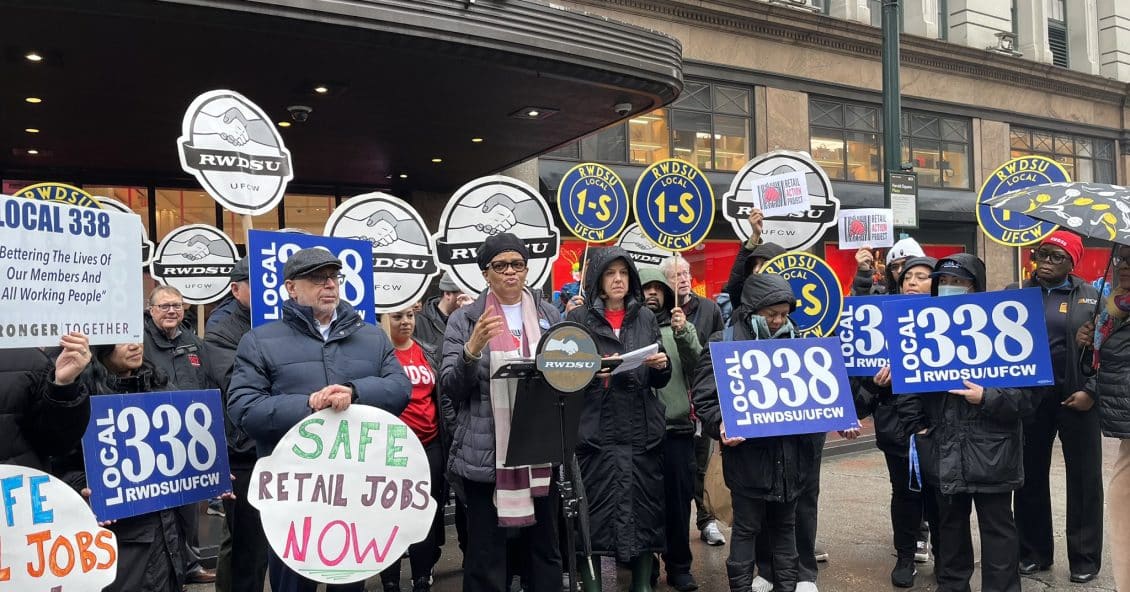Commerce unions win better legislation against violence and harassment at work
28.04.25
Abuse against commerce workers surged during the pandemic, but data from around the world shows the problem has outlasted mandatory mask policies and social distancing guidelines.
In Australia, the SDA union found that 87 per cent of retail workers have faced verbal abuse from customers. USDAW in the UK reports that 77 per cent of workers experienced verbal abuse and 53 per cent were threatened, with roughly half of women and non-white workers targeted because of their identity. A survey by RWDSU/UFCW revealed that over 80 per cent of retail workers in the United States fear an active shooter, yet only 7 per cent say their employer made safety improvements after violent incidents.
In response, commerce unions are stepping up. Across the globe, they’re launching new campaigns to tackle workplace abuse and demand the protections their members deserve.
These campaigns have already paid off with the introduction of better legislation in multiple countries:
Japan: Akita and Tokyo ordinances protect shop workers
UA ZENSEN’s campaign against third-party violence in Japan, has played a key role in winning change for workers. For example, the Tokyo Ordinance on Protection of Workers from Customer Abuse went in to effect this month.
The ordinance, the first of its kind, focuses on preventing customer harassment, commonly referred to as “kasu-hara.” The law prohibits harassment and discourages a wide range of customer conduct that may cause “significant annoyance” to workers and may be harmful to the working environment.
Specifying the responsibilities of the Tokyo Metropolitan Government, customers, workers and employers, the ordinance requires customers to be careful about their words and behaviour. It also stipulates that employers must “work to take necessary and appropriate measures” to prevent such conduct. The ordinance does not introduce new penalties, but depending on the nature of the conduct, customers’ behaviour might be punishable under existing law.
“UA ZENSEN has been working on customer harassment since 2015, and it has taken ten years to finally have ordinances enacted in Tokyo and other prefectures, which is a significant progress. Furthermore, a bill is about to be passed in the 2025 Diet session that will require companies to take measures to prevent customer harassment,” said Tomoko Nagashima, the President of UNI affiliate UA ZENSEN. “The driving force behind our activities is the voice of our members. Our goal is to build a society where both providers and receivers of services are respected. We will continue our activities to improve customer harassment prevention.”
The Tokyo ordinance builds on the success of the April 2022 Akita Prefecture Basic Ordinance for Creating a Diverse Society – the first comprehensive preventive measures to tackle harassment faced by commerce workers in Japan.
UK: Changing criminal law to protect workers
A recent survey by UK union USDAW finds that 93 per cent of retail workers want to see a change in the law giving them increased protection.
In late February 2025, the UK government introduced the Crime and Policing Bill to the parliament. If passed, the bill will create a separate offence of assaulting a retail worker with a maximum sentence of six months and remove the £200 low value limit for shoplifting to deter any thefts.
This bill would build on an act adopted in England and Wales in April 2022 which classified retail workers as providing services to the public and therefore made attacking a retail worker an aggravated offence.
Sweden: Refusal of Access Law
Thanks to the tireless efforts of UNI’s Swedish affiliates Handels and Unionen, Sweden was the first country to introduce specific legislation for commerce workers in 2021. According to the “Refusal of Access Law” a customer may be banned from accessing a shop if there is a risk that they will commit a crime or harass someone in the shop. Anyone who violates an access ban can be fined or imprisoned for up to six months.

Julia Salomonsson, an employee of Swedish retailer ICA, was among the first workers helped by the new legislation. An obsessed customer stalked her despite her repeated requests he stop. Through the law, she got him banned from entering the shop where she works or contacting her. The ban was later extended and a prison sentence would be the next step.
“I did not expect the prosecutor to ask for prison time,” said Julie. “It feels good that they are taking this seriously.”
Scotland: The Protection of Shopworkers Act
Sweden was followed by Scotland, with the adoption of the Protection of Shopworkers Act in 2021. The law was the first victory of USDAW’s long-running “Freedom from Fear” campaign, which contributed to the introduction of similar legislation in England and Wales as well.
The law created a new statutory offence of assaulting, threatening, abusing, obstructing or hindering a retail worker. This charge can result in a fine, with penalties escalating to a prison sentence of up to 12 months. An additional statutory aggravation can be added when the retail worker is enforcing a statutory age restriction.
The police recorded 3,277 crimes against retail workers in the first year of the act. Most of these (1,130) were crimes of threatening or abusive behaviour of a retail worker. A further 786 involved common assault of a retail worker, there have also been eight serious assaults.
Australia: Multiple laws in multiple states and territories
The SDA Union’s “No One Deserves a Serve” campaign has been the driving force behind the better protective legislation passed in multiple states and territories in Australia.
In 2022, both Western Australia and New South Wales, Queensland and the Northern Territory placed higher sanctions for unruly customers in response to the increasing abuse during the pandemic. In the following years, South Australia, New South Wales and Western Australian parliaments either introduced a specific offense for assaulting retail workers during their duties or increased penalties for customers who assault retail workers on job.
The Parliament of Victoria is currently considering legislation with new protections for customer-facing workers, including those in retail.
United States: Retail Safety Worker Act

Campaigning from our U.S. affiliate, RWDSU has led to a landmark Retail Safety Worker Act in the state of New York, designed to protect commerce workers in a time of escalating and deadly violence.
Signed into law in September 2024, the act requires commerce employers with ten or more employees to adopt a retail workplace violence prevention policy and provide annual training for employees. All retail employers with more than 500 employees nationwide must install panic buttons or offer wearable or mobile-phone based panic buttons to all employees.
The new legislation has already started helping retail workers in New York to secure better protection. The very first collective agreements at Barnes&Noble bookstores in New York secured safety gains that go beyond the law including a safety committee and measures from violence and harassment at work including de-escalation trainings and the ability to walk away from unsafe situations.
“I’m most excited about the many safety provisions we were able to include in the contract in order to keep me and my coworkers as safe as possible while we do our jobs!,” said Bear Spiegel, a Bookseller at the Barnes & Noble Flagship store in Union Square, New York City.
A global effort to end customer abuse in commerce
Taking lessons from these affiliate victories – and more – UNI has an ongoing effort to support unions fighting customer abuse.
“These wins are a testament to the power of commerce unions fighting for their members,” said Mathias Bolton, Head of UNI Commerce. “We welcome the new legislation and congratulate our affiliates for securing essential protections. But the fight isn’t over – through our global campaign, we’ll keep pushing until every commerce worker, everywhere, is safe on the job.”


